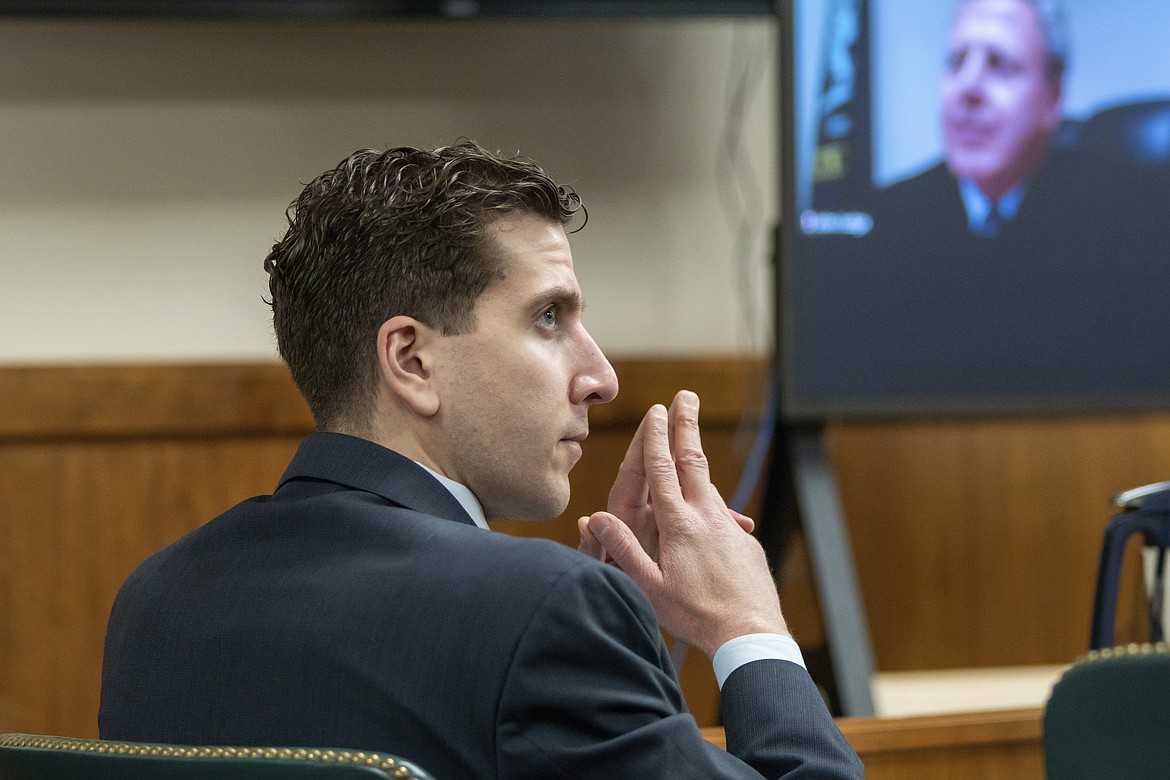Unidentified blood DNA at Idaho college student homicides home could aid Kohberger defense
Detectives who investigated the Moscow college student homicides found blood at the crime scene from two still-unidentified males, attorneys for the man charged with murder revealed at a recent hearing, hinting to a possible legal defense strategy at trial.
An unknown individual’s blood DNA was discovered on a handrail in the off-campus home where the four University of Idaho students were fatally stabbed. Another unknown blood sample was found on a glove that police located just outside the home, Bryan Kohberger’s lead defense attorney told the court late last month.
In the bed of one of the stabbing victims, police said they also found what many regard as the case’s key piece of evidence: a leather sheath for a fixed-blade knife. During processing, DNA was discovered on the sheath and later matched directly to Kohberger, police and prosecutors said. In legal filings from June 2023, his defense said the state’s claim is not from blood, but rather touch DNA on the sheath located at the violent scene.
In those same filings, the defense said, DNA from two additional males was found inside the home, as well as the male DNA found on the glove outside. Latah County Prosecutor Bill Thompson told the court at a hearing in August 2023 that those DNA samples were not uploaded to try to identify them through the FBI’s national DNA database, known as CODIS, because they were not eligible based on the criteria.
It was not publicly known until last month’s court hearing that at least two of the unknown male DNA samples came from blood. And the type of the third male DNA sample remains unclear, as does if its source has since been identified.
But police did not disclose the unidentified blood DNA samples to a magistrate judge in December 2022 when they sought a warrant for Kohberger’s arrest, defense attorney Anne Taylor alleged at last month’s hearing, and prosecutors did not dispute. That decision amounted to detectives intentionally omitting the information to the judge for her determination of probable cause, and should disqualify some evidence, Taylor said.
Ada County District Judge Steven Hippler pushed back on the defense at the January hearing.
“How does that, even if disclosed, preclude a finding of probable cause when there’s a DNA match between the DNA on the sheath and Mr. Kohberger?” he asked Taylor. “Isn’t that probable cause every day and twice on Sunday?”
Probable cause shouldn’t be considered in a vacuum, Taylor responded. She indicated that the decision before Hippler had greater implications for the overarching criminal justice system.
“If that’s the only thing she’s told, I can see why she’d find probable cause,” Taylor said of the magistrate judge. “It’s these other things that are withheld that create a context around it. … Do we want to have one thing with no context around it when there’s this other context that really matters?”
Kohberger’s defense seeks to challenge several search warrants and evidence obtained with them at what’s known as a Franks hearing. The request is akin to appealing the magistrate judge’s probable cause finding, and rarely succeeds, legal experts told the Idaho Statesman. The prosecution objected to the granting of that hearing and Hippler has yet to issue his ruling.
Kohberger, 30, a former graduate student at Washington State University in Pullman, Washington, is accused of the November 2022 college student killings at the off-campus home on King Road in Moscow just over the Idaho state line. He is charged with four counts of first-degree murder and one count of burglary.
The four victims were Kaylee Goncalves, 21, of Rathdrum; Madison Mogen, 21, of Coeur d’Alene; Xana Kernodle, 20, of Post Falls; and Ethan Chapin, 20, of Mount Vernon, Washington. The three women lived in the rental home at 1122 King Road with two other women who went physically unharmed in the early-morning attack, while Chapin was Kernodle’s boyfriend and stayed over for the night.
A grand jury in Moscow unanimously found probable cause and indicted Kohberger on all five felony charges. In May 2023, a not guilty plea was entered by a Moscow judge on Kohberger’s behalf when the defendant declined to speak at his arraignment. The high-profile case has since been moved to Boise, with trial scheduled for this summer.
Read the rest of the article on Idaho Statesman's website.

